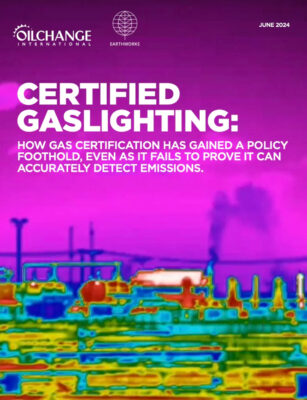Sign up for daily news updates from CleanTechnica on email. Or follow us on Google News!
Producers of methane gas have a problem. What they are selling is a climate-killer 80 times more powerful than carbon dioxide. For many decades, the world has focused on carbon dioxide when planning ways to address global heating. If you read the final reports from the Paris climate conference in 2015, the word “methane” is largely absent from any texts. The result of that historic international meeting was all about reducing carbon emissions, and why not? The world has a nervous eye on the carbon tracker at Mauna Loa, Hawaii, the one that measures the amount of carbon dioxide in the atmosphere. Until recently, there was no similar tracker for methane.
But now there is. At COP 27 in Scotland, the UN announced a new high-tech, satellite-based global methane detection initiative — Methane Alert and Response System (MARS) — which will leverage satellite data to alert governments, companies, and operators about large methane sources to enable faster mitigation. The data from those satellites shows for the first time huge plumes of methane from oil and gas operations around the world, many in former Soviet Union nations or in Russia itself, but many in Europe, the US, and China as well. Methane has a nasty habit of escaping into the atmosphere, but since it is odorless and colorless, its release often goes undetected.
Methane Monitoring
After the truth about methane became public knowledge, a new industry was born — methane monitoring. Supposedly, a new generation of methane monitors became available that promised to detect methane leaks. The industry was quick to glom onto these new devices to “prove” that their methane supplies were not being released into the atmosphere. That, in turn, led to a new marketing strategy — marking up the supposedly “certified gas” and selling it at a premium. Sounds good on paper, but according to a report by Oil Change International and Earthworks published June 18, 2024, the monitoring systems have yet to be proven effective in real world use.

The report says, “Fossil fuel companies are under public pressure to address the climate crisis and reduce pollution. In response, almost 40% of US gas is now “certified” by third party companies, allowing fossil fuel producers to claim reduced methane emissions from their operations. The problem? The claims are false. Gas certification threatens climate goals by promoting false data and enabling gas companies to expand operations under the guise of reduced emissions. The report finds:
- Industry operated continuous emissions monitors (CEMs) at well sites regularly miss pollution events.
- “Continuous” monitors belonging to Project Canary – a certifying company – are inexplicably offline over 25% of the time.
- Fossil fuel companies rarely take action to address pollution when it is detected.
- Industry and regulators see opportunity for profit in certification schemes.
Marketing Methane As A “Clean Fuel”
According to Inside Climate News, more and more methane producers are looking to identify their products as clean fuels by obtaining “gas certification” from third party companies that monitor wells and other gas infrastructure for methane emissions. However, gas certification is an unregulated industry and the monitoring systems that companies employ routinely miss the methane they were designed to detect.
“Certified gas is a greenwashing scam,” said Dakota Raynes, a researcher with Earthworks who is a co-author of the report. “There is not nearly enough evidence from the certifiers or the oil and gas industry itself that this gas is actually indeed [associated with] lower methane emissions.” Project Canary, one of the leading emissions monitoring companies offering low methane certification to oil and gas companies, contested the findings. It said it was not certifying any of the sites included in the report and that the report “contains numerous inaccuracies and mischaracterizations.”
Gas certifications have wide-ranging implications that go far beyond the bragging rights of individual gas producers, ICN says. Methane, the primary component of natural gas, has a lower climate impact than coal or oil when burned, but it is also a potent greenhouse gas if it leaks or vents into the atmosphere. Project Canary and two other companies — Equitable Origin and MiQ — provide certifications for nearly 40% of all gas produced in the United States according to the report, and utility companies that use it have begun charging ratepayers a premium for it.
Theory Vs Reality
Arvind Ravikumar, co-director of the Energy Emissions Modeling and Data Lab at the University of Texas at Austin, who was not involved in the report, said the continuous monitors employed by gas certification companies are “the holy grail” of methane emissions detection. He said the devices work well in controlled settings, but cautioned that the technology is still in its early stages of development and may not meet the same performance standards when deployed in the field.
The June report was based on 81 surveys by Earthworks of 38 different oil and gas production sites where gas certification companies had deployed continuous monitoring equipment. Using a type of thermal camera known as optical gas imaging (OGI), Earthworks detected 23 pollution events. They then filed public record requests with the state of Colorado to see if the same pollution events had been detected by the gas certification companies. With the exception of one such event, the answer was no, the report said. Twelve of the 23 emission events documented by Earthworks occurred at sites with Project Canary monitors, yet only one was detected by Project Canary. The environmental groups also noted that Project Canary’s monitors were down, or inoperable, 26% of the time over an 11-month period.
But company officials said “none of the sites referenced in the report were ever certified by Project Canary.” The company’s monitors at those locations detected volatile organic compounds (VOCs). VOC detection is often used as a proxy for methane detection as emissions from oil and gas wells typically contain a mix of each. Colorado state regulations require oil and gas producers to monitor new wells for “hydrocarbon emissions” during pre-production and early production stages of operation, but allow operators flexibility in which pollutants they monitor. Project Canary said it detected 7 of the 12 emissions events, but under state law was only required to report one of those events to regulators. The company conceded that three of the events Earthworks detected occurred at times when its sensors required maintenance. However, it said one event occurred a month after the company removed its monitors, given that state regulations require monitoring at new well sites only during pre-production and the first six months afterward.
Concerns About the OCI/Earthworks Report
Ravikumar noted concerns both with the report and the emissions monitoring systems it scrutinized. “This is nowhere near a random sample,” he said of the 38 sites that the environmental groups focused on. A scientific study published in a peer-reviewed journal would typically assess oil and gas facilities that were selected at random. “They chose sites that are more likely to have emissions. Not all sites are subject to those requirements. So by definition, they chose sites that are more likely to have emissions.”
Raynes responded that all new oil and gas extraction sites in Colorado are subject to air quality monitoring and reporting requirements under Regulation 7. However, Earthworks and Oil Change International noted in their report that they prioritized surveys of oil and gas sites where they can assist communities in documenting concerns or exposing possible compliance issues. “At no point do we claim this is a random sample and it is impossible for us to have a priori knowledge of which sites are more likely to have emissions,” Raynes said. “The assertion that we selectively chose sites more likely to have emissions is not accurate.”
Senators Get Involved
A group of seven Democratic senators led by Ed Markey of Massachusetts wrote to Federal Trade Commission Chair Lina Khan in February, calling on the agency to “investigate and crack down on unfair and deceptive environmental claims made by fossil fuel producers and gas certification programs. So-called third party ‘certified gas’ is one of the most prominent forms of deception. It’s the same old gas with a sparkly new label.” Citing the Earthworks and Oil Change International report, the senators noted that certified gas harms consumers who pay a higher price for a commodity that may not be as clean as its producers claim.
“Utilities in Massachusetts, New York, Vermont, New Jersey, Michigan, Colorado, and Virginia have purchased or plan to purchase certified natural gas at premium rates and have received or sought approval to pass those costs — ranging from tens to hundreds of thousands of dollars a year — onto consumers,” the letter noted. In a letter to Markey in May, Khan said the FTC is currently reviewing its “Green Guides” governing environmental marketing claims.
Ravikumar said sensor performance needs to improve for gas certifications to be effective. “This will only work if certifications are trusted and stakeholders — that’s the public, the regulators and even the industry — believe that these certifications have value,” he said. Otherwise gas certifications lose that value. That’s what has happened with carbon offsets when projects that claimed to reduce emissions didn’t achieve their goals. “We have to avoid the pitfalls of the carbon offset markets that we have seen where now this offset market is junk. It’s not worth anything because people don’t trust the offset numbers. What’s most important in certification is trust. Everything else comes after that.”
The Takeaway
It’s a “he said, she said” story. The industry says it is doing a good job of monitoring its methane emissions. Critics say it’s all a scam. It’s hard to know where the truth lies, but given the history of the fossil fuel industry, the tie-breaker has to be its long history of lies, half truths, and deception. As Ronald Reagan might say, “Trust, but verify.”
It might also help if another arm of the fossil fuel industry had not recently filed suit to block new EPA rules designed to eliminated most PFAS plastic pollution from public drinking water supplies. Nothing embarrasses these clowns, and so it is not surprising their pious protestations about how they are working overtime to address methane pollution ring hollow in our ears. Trust the methane industry? Not in this lifetime.
Have a tip for CleanTechnica? Want to advertise? Want to suggest a guest for our CleanTech Talk podcast? Contact us here.
Latest CleanTechnica.TV Videos
CleanTechnica uses affiliate links. See our policy here.





